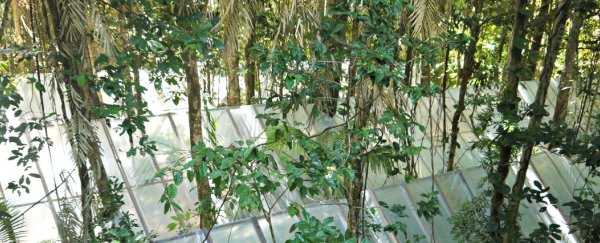Researchers at James Cook University in Australia have turned a hectare of the UNESCO-listed Daintree Rainforest into a living, breathing science experiment, in the hopes of figuring out how to better protect tropical species from future drought damage.
By covering some of the trees' roots with the clear plastic roof panels, the scientists are limiting their access to water in an attempt to see how they would cope with the increased periods of drought that are predicted to be brought on by climate change. Other tree roots will be left uncovered to act as a control group.
The results of the experiment will be monitored by around 600 sensors and a 47-metre-tall 'canopy crane', which is an elevated platform that moves around the treetops, allowing researchers to assess leaf health and get a bird's eye view of what's happening to the rainforest as a whole. You can see it in action in the video below:
The drought simulation is important, not just for the survival of the planet's rainforests, but also for future carbon sequestration, according to Susan Laurence, who's leading the multi-million dollar project.
"We estimate there are at least 45,000 tree species in the world's rainforests but only 1 percent of the species stores about 50 percent of the carbon," she explained in a press release. "We are trying to discover which tree species are most vulnerable to drought and which are more resilient. We will then know what the implications will be for future carbon storage, if droughts become more common."
Of course, while climate change won't necessarily dry out all regions of the planet, the latest research shows a significant decline in global rainfall over the past 30 years. "What we're modelling is a dramatic increase in climate seasonality; the dry will be drier, the wet will be wetter. We are assuming there will be six months of each and we are concentrating on producing the drought effect," says Laurence.ays Laurence.
The experiment will run until 2017 and the team at JCU is now looking for students and researchers to get involved. Let's hope the results contain some good news for the future of our rainforests.
Find out more about studying at JCU: Bachelor of Science (Ecology and Conservation), Master of Science (Zoology and Ecology), Master of Science (Ecology and Conservation)
